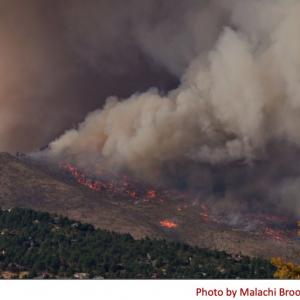Upcoming NC CASC webinar
Date
Fires of Unusual Size: Future of Extreme Wildfires in the Continental United States Thursday, December 8, 2022, 11 AM - 12 PM MST Presented by:
JILMARIE STEPHENS University of Colorado Boulder
Register in advance for this meeting.
After registering, you will receive an email confirmation containing information about how to join the meeting.
ABSTRACT:
Recent observed increases in wildfire activity across the contiguous United States (U.S.) and the increasingly apparent effects of climate change on fire regimes have created novel challenges for fire and ecosystem managers requiring more robust information on changes in future fire risk, especially for the largest fire events, over the next several decades. Today, the majority of wildfire ignitions are caused by human activities—so capturing anthropogenic aspects of changing fire activity beyond those associated with climate change is critically important. In this work, we use a Bayesian statistical model that includes projections of where people will be located on the landscape, as well as projections of future atmospheric conditions from downscaled climate model simulations using a moderate warming trajectory (RCP 4.5), to make predictions regarding the number, size of the largest fire, and overall area burned by wildfires in each Environmental Protection Agency (EPA) level-3 ecoregion across the U.S. over the next four decades. By 2020-2060, we project an average increase in the number of fires (+56%) and burned area (+59%) across the U.S. compared to the historical period (1984-2019). For the largest fire events, we find nearly ubiquitous increases across all ecoregions (contiguous U.S. average +63%). Overall, our results suggest that climate change in the coming decades will drive more frequent occurrences of fires in regions where wildfire was rare (i.e., much of the eastern U.S.), and unprecedented increases in the size of the largest fires in regions where fires were common (i.e., in the western United States).
About the speaker:
Dr. Jilmarie Stephens is a bio-micro-meteorologist studying ecosystem-atmosphere interactions in a changing climate, from surface layer turbulence to ecosystem scale climate, carbon balance, and wildfire regimes. Jilmarie received her B.S. and M.S. in Atmospheric Science at UC Davis and her Ph.D. in Soil Science from the University of British Columbia. Her doctoral work focused on long term trends in Boreal forest ecosystems using both flux tower measurements and ecophysiological modeling techniques. She also studied the impact of an insect infestation event on the carbon and water fluxes at an aspen stand. Her postdoc at NC CASC and Earth Lab is part of the Climate Adaptation Science Centers (CASC) 2021-2023 Climate Adaptation Postdoctoral Fellows Program focusing on the “Future of Fire”. Her research focuses on understanding future changing wildfire regimes across the US using past fire and climate observations and numerical modeling for projected climate variables under various climate change scenarios.


